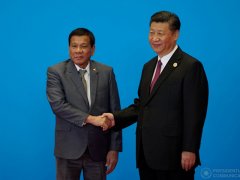News
Duterte’s ‘pivot’ to China very timely: Roque

Philippine-Chinese relations have been rejuvenated after Duterte temporarily shelved the arbitral tribunal’s decision nullifying China’s nine-dash line map that covers almost the whole of the South China Sea. (PNA photo)
MANILA – Malacañang said Thursday President Rodrigo Duterte’s decision to pivot to China, and not to be confrontational in resolving the West Philippine Sea dispute, is very timely.
Presidential Spokesperson Harry Roque said all economic activities are now in Asia, with China’s modern “Belt and Road” economic integration initiative boosting trade and investment and people-to-people exchanges in the region.
“The pivot of the President to China is in conformity with new world history. The Silk Road details why this century is Asia’s century. So our pivot is very timely because we will benefit while economic activities are in Asia,” Roque said an interview with Bro. Eddie Villanueva over Light TV on Thursday night.
The Philippines should take advantage of the country’s proximity to China, the world’s second largest economy, he said, noting that even President Donald Trump of the United States, a traditional ally of the Philippines, is taking steps to boost American trade with China.
“We will benefit from the economic gains that this part of the world has been getting,” Roque, an international law expert, said.
“All the remaining colonial mentality, that’s obsolete already. The US is still strong, all the Nobel Prize awardees and good academics are still there but the truth is, the trades and investments are now in Asia.”
Philippine-Chinese relations have been rejuvenated after Duterte temporarily shelved the arbitral tribunal’s decision nullifying China’s nine-dash line map that covers almost the whole of the South China Sea.
Roque clarified that Duterte’s decision to set aside the ruling in 2016 does not mean the country’s is surrendering its maritime territory to China.
“We just set aside (a) problem that cannot be resolved overnight and pushed the non-contentious issues that we can agree on, like economic cooperation, trade and investments,” he said.
The Palace official said such contentious issues as the WPS disputes are being discussed through the Bilateral Consultative Mechanism (BCM), where leaders meet twice a year.
“All our problems in the WPS are being voiced out there and we’re finding solutions. We are doing something. We just don’t broadcast it,” he said. “We are not making a big deal out of it because we have bigger economic gains if we will temporarily set it aside and talk (about) the non-contentious issues.”
Roque said even Duterte has promised that he will not surrender even an inch of the Philippines’ maritime and land territories to any foreign country.
“The promise of the President, he will die first before he could surrender even an inch of our territories to foreigners,” he said.
China’s alleged militarization in the WPS will be discussed in the upcoming BCM meeting, Roque said.
“We have no capability to forcibly remove China there. He (Duterte) inherited this problem. The solution is, don’t give up the territory but be practical.
Push the interest of the country which is to provide food, clothes and shelters,” he explained. “On contentious issues, let us not touch them for now because I think the territorial dispute would have no resolution during our lifetimes.”
Duterte has repeatedly said he won’t go to a battle that the country cannot win but told Chinese President Xi Jinping that he will raise the issue of the arbitral tribunal’s ruling before he steps down in 2022.
Meanwhile, Roque clarified that the 2016 Permanent Court of Arbitration’s ruling covers only the maritime territory in the WPS since it is made by the arbitration court of the UN Convention on the Law of the Sea (UNCLOS).
“The problem is the ruling was only for artificial islands which are in our exclusive economic zone. But for disputed land territory, is not cleared yet. That’s why it is important to strengthen our friendly ties because as friends, we can easily agree on something,” he said.





















